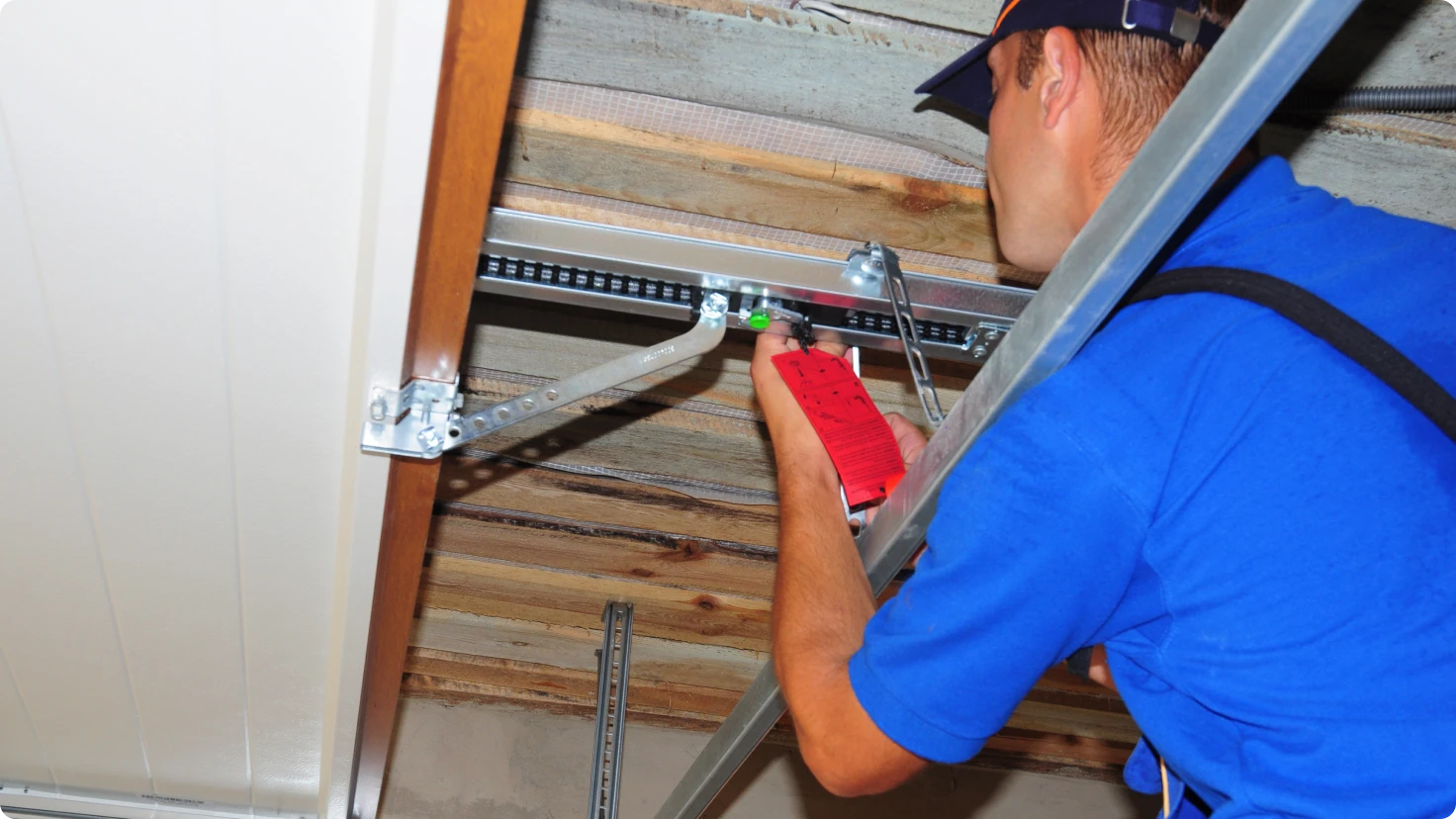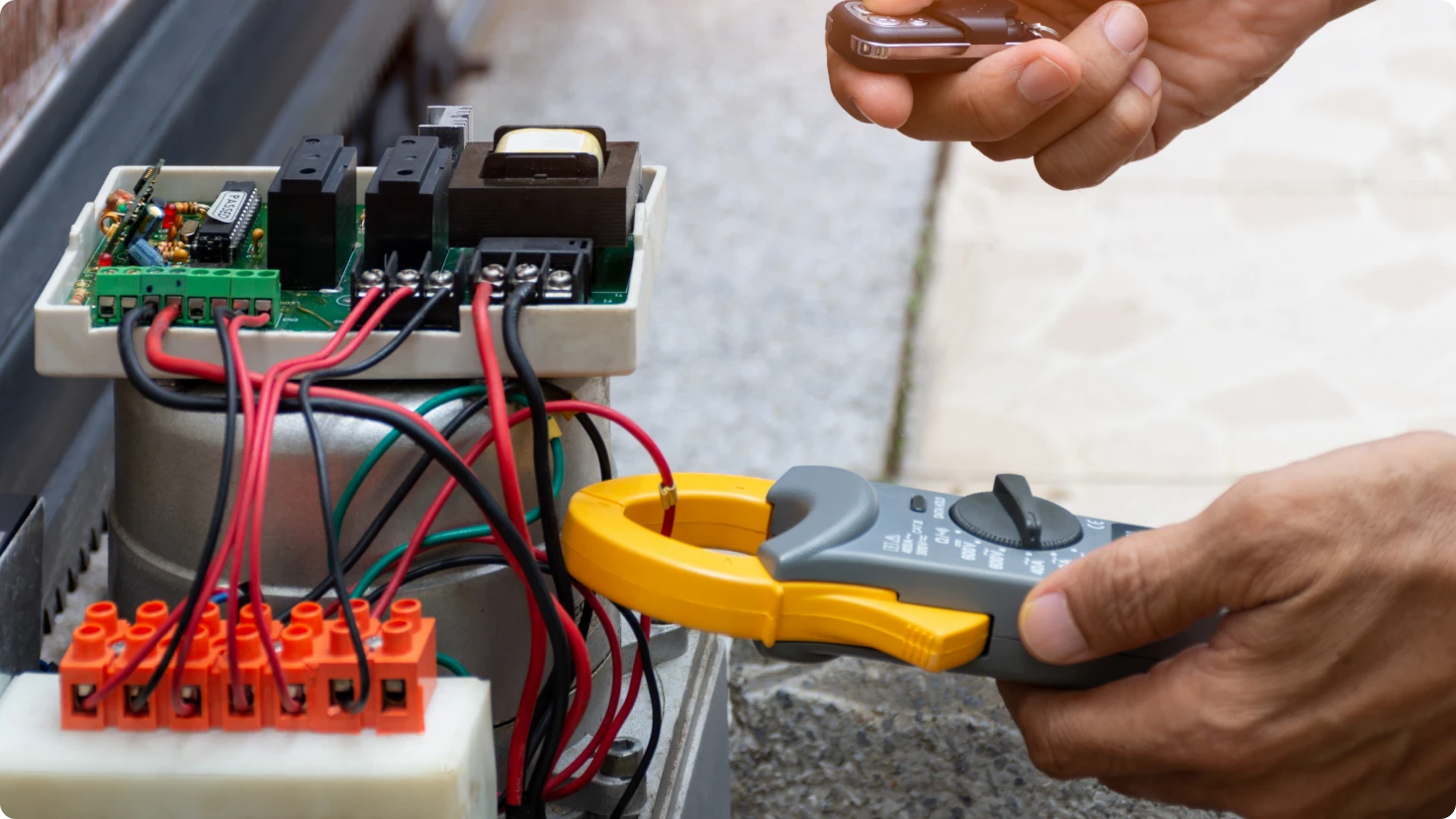Garage door technicians! These skilled professionals diagnose, repair, and install garage doors and openers, ensuring our garages function flawlessly.
But beyond the screwdrivers and springs, what awaits those considering a career in garage door repair? Let’s delve into the salary statistics, job market trends, and practical advice for both aspiring and experienced technicians.

The day to day of a garage door technician
Here’s a glimpse into the day-to-day life of a garage door technician.
Gear up
The day starts with checking and restocking the trusty work van. Tools, spare parts, safety equipment – everything needs to be in tip-top shape.
Schedule Shuffle: Technicians typically receive their job schedule for the day electronically. It could be a mix of repair calls, installations, or routine maintenance checks. Depending on the company and territory, technicians might spend a good chunk of their day driving between appointments.
On the job
Arriving at the customer’s home, the technician makes introductions and assesses the situation. This involves understanding the problem, listening to the homeowner’s concerns, and conducting a preliminary inspection of the garage door and opener.
Then comes troubleshooting which is a necessary skill to have in this line of work. Technicians use their knowledge and experience to pinpoint the issue, whether it’s a broken spring, malfunctioning sensor, or faulty wiring.
Then comes the question; Repair or Replace? Based on the diagnosis, the technician recommends the best course of action. Sometimes, a simple repair is all that’s needed. In other cases, parts might need replacement, or even the entire door system might require an upgrade.
Keeping the customer informed throughout the process is also important. Technicians explain the problem in layman’s terms, discuss options and pricing, and obtain approval before proceeding.
Tools of the trade
Technicians carry a variety of tools, from screwdrivers and wrenches to specialized equipment like spring tensioners and safety glasses.
Modern garage door systems often involve electronics and smart technology. Technicians need to be comfortable using diagnostic tools and troubleshooting tech-related issues. Working with heavy springs and machinery demands caution. Technicians prioritize safety by following proper procedures and using appropriate safety gear. check out our free to use Garage door invoice template.
Factors affecting garage door technician salaries
When our garage doors malfunction, garage door technicians are often the ones we call to get things back on track. But how much do these skilled professionals earn? Several factors influence garage door technician salaries, and understanding them can be helpful for both aspiring technicians and those seeking to hire qualified workers.
Like any profession, the salary of a garage door technician isn’t a fixed number. It’s a bunch of several interlocking pieces determining how much they can earn. Let’s unlock the factors that influence their financial rewards:
Experience
One of the most significant factors impacting garage door technician salaries is experience. As technicians gain experience, they become more proficient in diagnosing and repairing problems, leading to increased efficiency and customer satisfaction. This often translates to higher wages, with senior technicians commanding salaries at the upper end of the pay scale.
Education and certifications
While formal education isn’t always required, obtaining certifications can significantly boost a technician’s earning potential. Certifications demonstrate competency and knowledge in specific areas, making technicians more attractive to employers and potentially qualifying them for higher-paying positions.
Some relevant certifications include the Certified Automatic Door Technician (CADT) credential offered by the International Door Association (IDA) and the Certified Professional Door Installer (CPDI) designation from the Door and Access Systems Manufacturers Association (DASMA).
Location
Geographic location plays a crucial role in determining garage door technician salaries. Technicians working in metropolitan areas with higher costs of living typically earn more than those in rural areas.
Additionally, demand for garage door repair services can vary depending on the region, with areas prone to extreme weather conditions often seeing higher technician wages.
Average garage door tech salary by state
Employer type
The type of employer can also impact a technician’s salary. Large companies and national garage door repair chains may offer higher base salaries and benefits packages compared to smaller, independent businesses. However, smaller businesses may provide opportunities for ownership or profit-sharing, potentially leading to higher long-term earnings.
Additional skills and specialties
Garage door technicians who possess additional skills and specialties can command higher salaries. This could include expertise in working with specific garage door brands or models, knowledge of electrical or mechanical systems, or the ability to perform preventative maintenance and safety inspections.
Soft skills and customer service
Beyond technical skills, soft skills and customer service abilities are essential for garage door technicians. Excellent communication, problem-solving, and time management skills are all highly valued by employers and can contribute to higher pay. Technicians who consistently provide exceptional customer service may also be eligible for bonuses or performance-based raises.
Salary ranges and averages
The national average salary for garage door technicians in the United States is around $45,000 per year. However, this can vary widely depending on the factors mentioned above. Entry-level technicians with limited experience might start in the low to mid-$30,000 range, while experienced technicians with certifications and specialization can earn upwards of $60,000 or more.
Average garage door tech salary by state
Here’s a table showing the average annual salary for garage door technicians by state in the United States (as of January 2024).
The difference between commercial and residential garage door services
Not all garage doors are created equal. While they may share the same basic function of opening and closing a space, the doors used in commercial and residential settings have distinct differences that necessitate specialized service. Understanding these differences is important for both property owners and service providers to ensure proper maintenance, repair, and installation.
Size and weight
One of the most striking differences is size. Commercial garage doors are often much larger and heavier than their residential counterparts. They may need to accommodate large vehicles like trucks, forklifts, or even specialized machinery. This necessitates the use of sturdier materials, reinforced tracks, and more powerful motors. Residential doors, on the other hand, are typically sized for cars and smaller SUVs.
Durability and frequency of use
Commercial garage doors are subjected to significantly more wear and tear than residential doors. They experience a higher frequency of openings and closings, often carrying heavier loads. This necessitates the use of more durable materials like galvanized steel or aluminum, as well as robust components like heavy-duty springs and reinforced hinges. Residential doors, in contrast, are designed for less frequent use and lighter loads.
Security features
Security is a major concern for commercial properties, and garage doors play a crucial role in protecting valuable assets and inventory. Commercial doors often incorporate enhanced security features like rolling code technology, crash bars, and break-in resistant materials. Residential doors may have basic security features like locks and deadbolts, but they generally prioritize aesthetics and affordability over high-level security.
Maintenance and repair requirements
The complexity and heavy-duty nature of commercial garage doors necessitate specialized maintenance and repair services. Technicians servicing commercial doors require specific training and expertise in handling larger, heavier systems and specialized components. Residential door repairs, while important, are often less complex and can sometimes be handled by skilled DIYers.
Cost of service
Due to the increased complexity, specialized skills, and heavier equipment involved, commercial garage door services typically come at a higher cost than residential services. This reflects the additional time, expertise, and resources required to maintain and repair these robust systems.
Job outlook and career opportunities for garage door technicians
For many, a malfunctioning garage door is a mere inconvenience. But for skilled garage door technicians, it’s an opportunity to showcase their expertise and bring much-needed relief to homeowners and businesses. And the good news is, the job market for these essential workers is looking bright!
Rising demand with a steady climb
The Bureau of Labor Statistics projects a 7% growth rate in employment for automotive service technicians and mechanics, which includes garage door technicians, between 2020 and 2030. This translates to roughly 17,300 new job openings each year, a promising indicator for aspiring technicians.
This growth is fueled by several factors:
- An aging population with increasing vehicle ownership means more garage doors to maintain and repair.
- Rising home values lead to homeowners investing more in home improvement projects, including garage door upgrades and replacements.
- Increased focus on preventative maintenance as people look to extend the lifespan of their valuable garage doors.
Specialization open doors (and garages)
While the general job outlook is positive, technicians who specialize can further enhance their career prospects. Here are some areas where expertise can be a game-changer:
Commercial garage doors
Servicing the larger, more complex doors used in warehouses, factories, and other commercial settings requires specialized knowledge and skills. Technicians who master this niche can command higher salaries and enjoy greater job security.
Automation and Smart Technology
As smart homes and connected devices become more prevalent, technicians who understand garage door opener systems and integrations will be in high demand. Automation for your business is important but so is the ability of business technicians to offer up-to-date solutions.
Custom Door Installations
High-end homes and unique architectural designs often require custom garage doors. Technicians who can design, build, and install these customized solutions will find themselves in a competitive edge.
Earning potential and career paths
The median annual salary for garage door technicians in the United States is around $45,000, with experienced technicians and those with specialized skills earning upwards of $60,000 or more.
Beyond salary, garage door technicians enjoy several career advancement opportunities:
Supervisory roles
Experienced technicians can move into team leader or service manager positions.
Owning a business
Many technicians eventually start their own garage door repair companies, enjoying the freedom and potential for higher income. Click to learn about Workiz field service software for garage door companies
Training and Education
Sharing knowledge by becoming instructors or developing training programs is another rewarding path.
Tips for negotiating a higher salary as a garage door technician
So, you’re a skilled garage door technician, keeping people’s access points functioning smoothly. But your paycheck isn’t reflecting your true value. Don’t fret! Negotiating a higher salary is an essential skill for any career, and here are some tips to help you ace that conversation.
Know your worth
Research. Before stepping into the negotiation, arm yourself with knowledge. Understand the average salary for technicians in your area with your experience and skillset. Use online resources, industry reports, and job postings to gather data.
Your accomplishments. Don’t be shy! Create a list of your achievements, certifications, and areas of expertise. Quantify your contributions whenever possible. Did you increase customer satisfaction by X%? Did you save the company money by implementing a new repair technique?
Confidence is key
Believe in yourself. You deserve fair compensation for your skills and hard work. Walk into the negotiation with confidence in your abilities and your worth. Practice your talking points beforehand to avoid feeling flustered.
Positive framing. Focus on the value you bring to the company. Highlight how your expertise benefits them, whether it’s increased efficiency, reduced downtime, or higher customer satisfaction.
Master the art of the negotiation
Now it’s time to negotiate and here’s how to go about it:
Set your target. Before the discussion, decide on your ideal salary and a minimum acceptable amount. Aim high, but be realistic. Remember, negotiation is a process, and you might need to compromise.
Open strong. Don’t wait for the employer to bring up salary. Initiate the conversation and state your desired compensation confidently. Use phrases like “My desired salary range is…” or “I believe my experience and skills warrant…”
Be prepared to back up your claims. Be ready to provide evidence to support your salary request. Use your list of accomplishments and market research to justify your position.
Listen and respond. Actively listen to the employer’s offer and concerns. Understand their perspective and be willing to negotiate. If they have a lower offer, politely counter with your minimum acceptable amount, explaining why you believe it’s fair.
Non-monetary perks. Finally, consider alternative benefits that might compensate for a slightly lower salary. This could include additional paid time off, company car benefits, or training opportunities.
FAQs
The average annual salary for garage door technicians in the United States is around $45,000 (as of January 2024).
Garage door technician salaries are in the mid-range compared to other skilled trades. They are higher than many service or retail jobs, but lower than some specialized trades like electricians or plumbers. The specific comparison depends on the specific trade and its demand in a particular area.
Yes, there are significant differences in salary for entry-level and experienced technicians. Entry-level technicians with limited experience might start in the low to mid-$30,000 range, while experienced technicians with certifications and specialization can earn upwards of $60,000 or more.
The salary of a garage door technician can vary greatly depending on several factors, including experience, location, certifications, and employer type.
Skillset and Performance: Excellent communication, problem-solving, and customer service skills can contribute to higher pay, as can consistently exceeding performance expectations.
Absolutely! Obtaining certifications and specializations demonstrates expertise and knowledge, making technicians more attractive to employers and potentially qualifying them for higher-paying positions. Relevant certifications include CADT (Certified Automatic Door Technician) from IDA and CPDI (Certified Professional Door Installer) from DASMA.
Yes, there are several paths for advancement and salary growth. Experienced individuals can move into supervisory roles like team leader or service manager, taking on increased responsibility and enjoying boosted pay. Owning a business is another compelling option, offering greater control and the potential for significant income. Sharing knowledge through training programs or becoming an instructor can be another rewarding path with competitive compensation. Lastly, focusing on a niche like commercial door repair or automation can open doors to specialized, high-paying roles.
According to recent data, some of the highest-paying regions for garage door technicians include California, New York, Washington D.C., Massachusetts, and Colorado.











